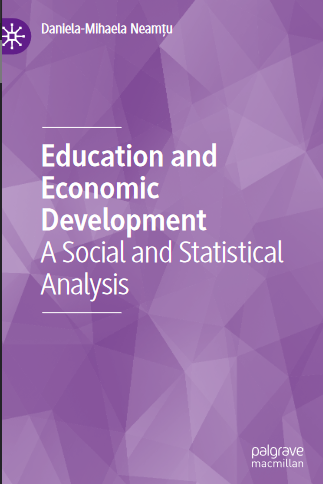10 Education—Foundation oF Social and Economic dEvElopmEnt Education represents the core element of humanity according to Kant, as “the human being cannot become a human being but through education” (Kant, 1996). Education has evolved over time. Centuries ago, education focused on the human being’s transformation to live an intense Christian life, train individuals to serve in the army, and become scholars and artists. Present-day education (apart from the previously mentioned aspects) focuses on instructing the individual according to the existing political and economic situation. The importance of education as an act of conscience influencing not only the future well-being of a nation but also its power, influence, and existence as a distinct entity both regionally and worldwide is unanimously acknowledged in all fields of activity. From an etymological point of view, the term education originates from the Latin noun educatio, a noun that derives from two verbs: • educo—educare—to raise, to nourish, to care for a plant, for a human being; • educo—educere—to pull out of, to rise, to uplift, both literally and figuratively. Throughout historical times, as part of the educational process, these two aspects have come together, have coexisted, and have influenced the education as such in terms of the following: • educational fatalism—an individual represents the very result of the environment; thus, he/she can be raised and cared for by the educa- tor himself; • educational optimism—which minimizes, or even ignores, the inter- nal factors by offering education a top priority that is able to shape any type of personality starting from a newly born individual viewed as tabula rasa. There is no unanimously accepted definition for education. Several com- menters have defined the educational phenomenon based on their own field of expertise, such as philosophy, psychology, sociology, pedagogy, and eco- nomics. Thus, the complexity and heterogeneity of the educational system confer the term of education transdisciplinary attributes. D.-M. NEAMŢU 11 Education, as a social phenomenon characterizing humans, differs from one historical stage to another based on society’s material and spiritual conditions. It is the result of one’s specific requirement, namely, the human development for the workforce and its own social existence. Some scholars believe that the early days of education are linked to the begin- nings of religion and, thus, the religious servants initiated those around them in certain religious mysteries. The studies on the historical evolution of education have shown that if in the first stage, namely, the early days of humanity, education was meant to pass on the necessary work and social related knowledge to the young generation to survive, the ancient times revealed another facet of education. This type of education had a guild type of nature and was linked to the material means, namely, funding, because the costs of the educational services were significantly high. Civilizations developed in Ancient near East, in the countries that were situated in the regions of the large rivers (such as the valleys of the Nile, the Tigris and the Euphrates rivers, Indus and the Ganges), had an impact on the forthcoming Greek and Roman cultures. The experience of the ancient cultures has a great influence in the field of education, although some existed in the BC era. The economic situation of a country is closely related to the level of education of that specific nation and not to the length of its borders, as “the countries whose population is highly edu- cated and well trained are the most productive ones from an economic point of view” (Blaug, 1970). Education is rooted in social nature and has a diachronic nature, which means it evolves and changes from stage to stage based on the structural transformations taking place in the society itself. The education in schools started later in the ancient civilizations. We can state that the origins of education can be traced back to Egyptian civilization since we can find in it the very first advocacy for the role of education in terms of the success of the individual from a material and a spiritual point of view. This historical approach in terms of ancient civilizations highlights two key aspects related to the role of education that are still valid today: through education, the individual is focused on becoming spiritually enriched and gaining wealth. The desire and need to be educated is a personal choice; thus, the results of the education are first and foremost individual ones. Education, both as a product ins
چکیده فارسی
10 آموزش – بنیان توسعه اجتماعی و اقتصادی آموزش و پرورش عنصر اصلی انسانیت را از نظر کانت نشان می دهد، زیرا "انسان نمی تواند انسان شود مگر از طریق آموزش" (کانت، 1996). آموزش در طول زمان تکامل یافته است. قرن ها پیش، آموزش و پرورش بر تحول انسان برای داشتن یک زندگی شدید مسیحی، آموزش افراد برای خدمت در ارتش و تبدیل شدن به دانشمند و هنرمند متمرکز بود. آموزش امروزی (به غیر از جنبه های ذکر شده قبلی) بر آموزش افراد با توجه به شرایط سیاسی و اقتصادی موجود متمرکز است. اهمیت آموزش به عنوان یک عمل وجدانی که نه تنها بر رفاه آینده یک ملت بلکه بر قدرت، نفوذ و موجودیت آن به عنوان یک موجودیت متمایز چه در سطح منطقه و چه در سراسر جهان تأثیر می گذارد، به اتفاق آرا در همه زمینه های فعالیت تصدیق می شود. از دیدگاه ریشهشناسی، واژه آموزش از اسم لاتین educatio سرچشمه میگیرد، اسمی که از دو فعل مشتق شده است: • educo-educare-پرورش کردن، تغذیه کردن، مراقبت از گیاه، برای انسان. • educo-educere- بیرون کشیدن، برخاستن، بالا بردن، هم به معنای واقعی و هم مجازی. در طول زمان های تاریخی، به عنوان بخشی از فرآیند آموزشی، این دو جنبه با هم جمع شده اند، همزیستی داشته اند و بر آموزش به عنوان چنین مواردی تأثیر گذاشته اند: • سرنوشت گرایی آموزشی - یک فرد بیانگر نتیجه محیط است. بنابراین، او می تواند توسط خود مربی بزرگ شود و از او مراقبت کند. • خوش بینی آموزشی – که با ارائه اولویت اصلی به آموزش، عوامل داخلی را به حداقل می رساند یا حتی نادیده می گیرد که قادر به شکل دادن به هر نوع شخصیتی است که از یک فرد تازه متولد شده به عنوان تابلوی رسا تلقی می شود. هیچ تعریفی به اتفاق آرا برای آموزش و پرورش وجود ندارد. مفسران متعددی پدیده آموزشی را بر اساس حوزه تخصصی خود تعریف کرده اند، مانند فلسفه، روانشناسی، جامعه شناسی، آموزش، و اقتصاد. بنابراین، پیچیدگی و ناهمگونی سیستم آموزشی، اصطلاح آموزش را ویژگیهای فرا رشتهای میدهد. D.-M. NEAMŢU 11 تعلیم و تربیت به عنوان یک پدیده اجتماعی که انسان را مشخص می کند، بر اساس شرایط مادی و معنوی جامعه از یک مرحله تاریخی به مرحله دیگر متفاوت است. این نتیجه نیاز خاص فرد است، یعنی رشد انسانی برای نیروی کار و وجود اجتماعی خود. برخی از علما معتقدند که دوران آغازین تحصیل با آغاز دین پیوند خورده است و بدین ترتیب خادمان دین اطرافیان خود را در اسرار دینی معینی آغاز کردند. بررسی های صورت گرفته در مورد تحول تاریخی آموزش نشان داده است که اگر در مرحله اول، یعنی دوران اولیه بشریت، تعلیم و تربیت به منظور انتقال کار و دانش اجتماعی لازم به نسل جوان برای بقا بوده است، دوران باستان چیز دیگری را آشکار می کند. جنبه آموزش این نوع آموزش ماهیتی صنفی داشت و با ابزار مادی یعنی تامین مالی مرتبط بود، زیرا هزینه های خدمات آموزشی بسیار بالا بود. تمدن های توسعه یافته در شرق نزدیک باستان، در کشورهایی که در نواحی رودخانه های بزرگ واقع شده بودند (مانند دره های رود نیل، رود دجله و فرات، سند و گنگ)، تأثیری بر یونان و آینده داشت. فرهنگ های رومی تجربه فرهنگ های باستانی تأثیر زیادی در زمینه آموزش دارد، اگرچه برخی از آنها در دوران قبل از میلاد وجود داشته است. وضعیت اقتصادی یک کشور ارتباط تنگاتنگی با سطح تحصیلات آن کشور خاص دارد و نه با طول مرزهای آن، زیرا «کشورهایی که جمعیت آنها بسیار تحصیل کرده و آموزش دیده هستند، از نظر اقتصادی پربازده ترین کشورها هستند. دیدگاه» (Blaug, 1970). تعلیم و تربیت ریشه در ماهیت اجتماعی دارد و ماهیتی دیاکرونیک دارد، یعنی بر اساس دگرگونی های ساختاری که در خود جامعه رخ می دهد، از مرحله ای به مرحله دیگر تغییر می کند. آموزش در مدارس بعدها در تمدن های باستانی آغاز شد. میتوان گفت که ریشههای آموزش را میتوان به تمدن مصر جستوجو کرد، زیرا میتوان در آن اولین دفاع از نقش آموزش از نظر موفقیت فردی از نظر مادی و معنوی را در آن یافت. این رویکرد تاریخی از نظر تمدنهای باستانی دو جنبه کلیدی مرتبط با نقش آموزش را برجسته میکند که امروزه نیز معتبر است: از طریق آموزش، فرد بر ثروتمند شدن معنوی و کسب ثروت متمرکز میشود. تمایل و نیاز به تحصیل یک انتخاب شخصی است. بنابراین، نتایج آموزش قبل از هر چیز فردی است. آموزش، هم به عنوان یک محصول
ادامه ...
بستن ...










